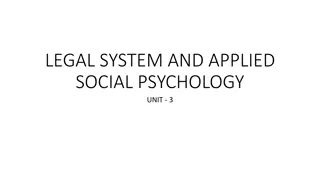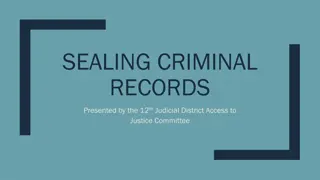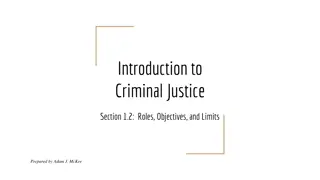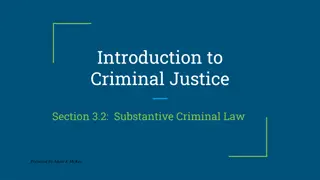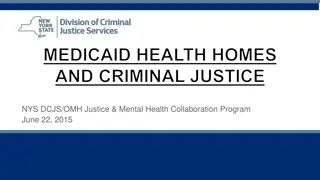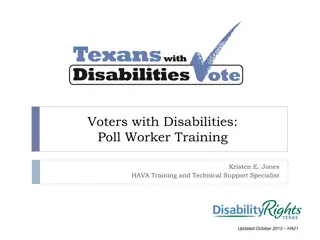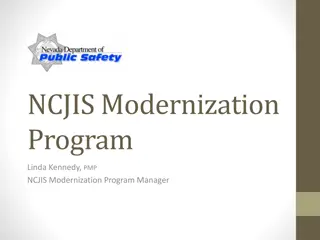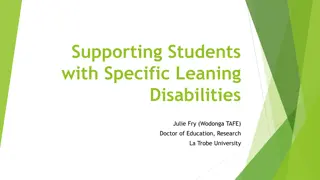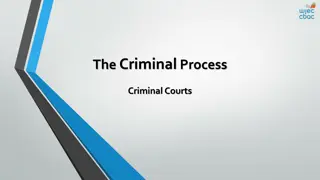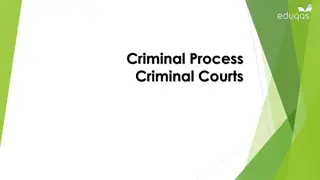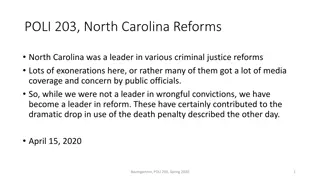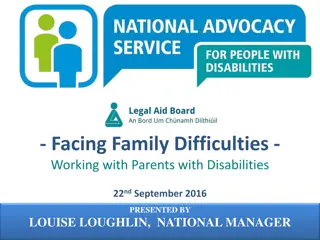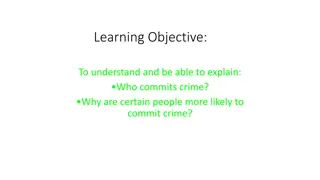Ensuring Justice and Support for People with Disabilities in the Criminal Justice System
Research highlights the overrepresentation of individuals with intellectual disabilities and mental health issues in the criminal justice system, underscoring the need for effective access to justice and appropriate accommodations. The Probation Service aims to rehabilitate offenders through community-based interventions while addressing social inclusion. Factors such as social disadvantage and behavioral challenges influence individuals' contact with the criminal justice system, emphasizing the importance of tailored support and services.
Download Presentation

Please find below an Image/Link to download the presentation.
The content on the website is provided AS IS for your information and personal use only. It may not be sold, licensed, or shared on other websites without obtaining consent from the author.If you encounter any issues during the download, it is possible that the publisher has removed the file from their server.
You are allowed to download the files provided on this website for personal or commercial use, subject to the condition that they are used lawfully. All files are the property of their respective owners.
The content on the website is provided AS IS for your information and personal use only. It may not be sold, licensed, or shared on other websites without obtaining consent from the author.
E N D
Presentation Transcript
Recognising and Responding: Delivering Services to People with Disability who are subject to Probation National Disability Authority National Conference 2020
Article 13 UNCRPD States Parties shall ensure effective access to justice for persons with disabilities on an equal basis with others, including through the provision of procedural and age-appropriate accommodations, in order to facilitate their effective role as direct and indirect participants, including as witnesses, in all legal proceedings, including at investigative and other preliminary stages. 2. In order to help to ensure effective access to justice for persons with disabilities, States Parties shall promote appropriate training for those working in the field of administration of justice, including police and prison staff.
The Probation Service Our Vision Our Mission: 15,000 offenders in the community Offender rehabilitation through respect, accountability, restoration and social inclusion. Safer and more inclusive communities where offending, and its causes, are effectively addressed. 400 staff 42 offices
Assessment and Supervision 1. Assessment Pre Sanction Reports for Courts Victim Impact Reports Parole Board/IPS Reports 2. Supervision and Rehabilitation of offenders: Probation type supervision (Probation of Offenders Act, 1907) Community Service (Criminal Justice (CS) Act, 1983) Young People (Children Act, 2001) Life Sentence Prisoners (Parole) Post-Release Supervision(SO Act, 2001, CJ Act 2005)
Disability in the CJS the experience Research indicates that people with intellectual disabilities and mental health issues are over represented in the criminal justice system (Hayes 2006, Murphy et al 2000) Much of this research also suggests that this group are also marginalised within the system
Factors influencing contact with CJS Factors influencing contact with CJS Social Disadvantage Educational Deficits Behavioural Challenges A- Previous contact with ID services/developmental service sector- diagnostically defined ID (Under-represented) B No legally defined ID/Cognitive deficit, but requiring intermittent supports and services (Over represented) Decision making processes - Vulnerabilities ( Jones.J 2007)
Circumstances Grew up in the care system, settled with same foster family since birth Behavioural and educational challenges Assault against foster parent No history of Criminal behaviour Supported by aftercare service Attending a training centre In a relationship excessive cannabis use Complex family history 20 year old Male First Court appearance Charged with an assault which is being heard in the Circuit Court, therefore to be regarded as serious. Probation asked to prepare a pre sanction report in the case.
As a Probation Officer Responding to specific issues related to FAS ( poor memory, organisation, emotional management, specific vulnerability to substances, decision making) Completing a risk assessment - no pro criminal beliefs, no anti social groupings, compliant and open in engagement. Outcome suspended sentence, supervision
VALUES/PRINCIPLES UNDERPINNING OUR WORK VALUES/PRINCIPLES UNDERPINNING OUR WORK Public Protection. Belief in the capacity of people to change. Probation Officers as change agents. Everyone has the right, irrespective of what they have done, to be treated with dignity and respect. Inter-agency working: No one agency working alone is as effective as agencies working together.
Looking Forward Looking Forward Training a) We have held training sessions with Headway, NRH, St Michaels House in the last 12 months b) In training on the provision of reports, assessments and supervision the importance of responsivity is always stressed c) Charging Staff Development Unit to increase specific training in relation to disability awareness Service Provision a) The new Offender Supervision Framework emphasises the importance of responsivity and relationship this is about individualising our responses b) Building on existing strong partnerships with partners CJS agencies to ensure common understanding of impact of dis/ability c) Considering estate management in relation to disability access/style d) Look to improve consultation access with specialist disability partners
Thank you David Williamson - Senior Probation Officer




